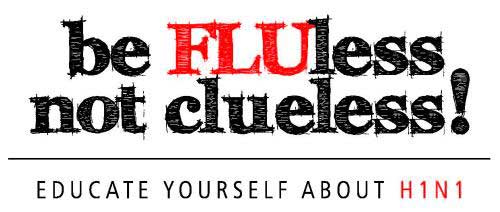The University of Lethbridge is urging students, staff and faculty to 'Be Fluless, Not Clueless' this fall as it deals with the spectre of Influenza A H1N1.
The campaign is designed to inform members of the University community on how to first avoid getting the flu and then, should they become ill, what to do and where to go to seek treatment. The Influenza A H1N1 concern is real and the U of L is taking the situation very seriously as it looks to head off the virus. The latest information and advice, compiled in consultation with the University Health Centre and Alberta Health Services, offers the best protection.
Sept. 30, 2009 UPDATE
As part of the ongoing efforts to ensure the safety of the University of Lethbridge community, the U of L's Medical Crisis Team has developed a self-reporting tool (H1N1 Influenza Illness Registry) for students and employees who are experiencing flu-like symptoms. This is another initiative to assist in minimizing the impact of H1N1 on the U of L campus.
The information gathered by the H1N1 Influenza Illness Registry will be utilized to assist the University in implementing the necessary actions regarding H1N1on campus and to ensure that pro-active measures are in place to minimize the impact on University operations.
The Registry does not replace the terms and conditions of the Faculty Handbook, the APO Manual, the Exempt Support Staff Manual or the AUPE Collective Agreement. Employees will still be required to notify their immediate supervisors that they are ill with flu-like symptoms. The registry is a voluntary tool that the University is asking employees to utilize.
As the medical system will be under heavy usage in this situation, the application of doctor's notes for personal illness and for illness within immediate families for flu-like symptoms, as outlined on the H1N1 website, will not be required. Any questions that people may have regarding the reporting of their personal circumstances can be addressed through their supervisor and Human Resources.
For further updates, continue to monitor the University's H1N1 Influenza website at: http://www.uleth.ca/ross/health_centre/h1n1
Take these Everyday Steps to Protect Your Health
1) Cover your nose and mouth with a tissue when you cough or sneeze. If no tissue is available, try to sneeze into clothing or the crook of your elbow.
2) Throw tissues carefully in the trash. Avoid public spitting of mucous and respiratory secretions.
3) Wash your hands frequently with soap and water. If your hands are not obviously soiled, hand sanitizer is a good second choice to clean hands.
4) Try to avoid touching eyes, nose and mouth frequently. Your hands may have touched something recently and germs spread quickly in the moist tissues of the face.
5) Perform extra cleaning of common surfaces at home or at school. Having cleansing wipes or hand sanitizer on hand is a good idea.
6) Prepare to stay home for a week or so should you become ill.
7) If you are sick with a flu-like illness, stay at home for at least 48 hours after your fever has subsided (except if you are in need of medical care). Try to protect the people you live with by staying separate from them, wearing a mask or extra cleaning.
8) For more information, see the following websites: www.albertahealthservices.ca; www.cdc.gov; www.fightflu.ca; www.publichealth.gc.ca
